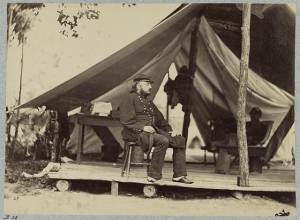Apparently, even Union Secretary of War Stanton had to rely on Confederate newspapers for his first report to General Dix regarding the failed attack on Fort Fisher. From The New-York Times December 29, 1864:
WILMINGTON.; THE ATTACK ON FORT FISHER. Rebel Accounts up to Tuesday Evening. OUR LAND FORCES RE-EMBARK. The Powder Ship Exploded within Three Hundred Yards of the Fort. BOMBARDMENT ON CHRISTMAS DAY. SILENCE OF THE REBEL FIRE. The Flag of the Fort Captured. …
WAR DEPARTMENT, WASHINGTON, Dec. 28 — 10:30 P.M.
Major-Gen. Dix, New-York:
The following extracts from Richmond papers of to-day have been received by the Department:
FROM WILMINGTON.
The following official dispatches were received last night:
WILMINGTON, Dec. 27 — 6 P.M.
To His Excellency, the President of the Confederate States:
The enemy has reembarked under the cover of his fleet. His movement is not developed. I have visited Fort Fisher, and find the damage slight, excepting the buildings not necessary for defence. Only two guns were disabled. The marks remaining indicate that the bombardment was very heavy. Maj. Gen. WRITING, commanding the defenses at the mouth of the river; Col. LAMB, commanding the fart, and the officers and men comprising the garrison, deserve especial commendation for the gallantry, efficiency and fortitude displayed under very trying circumstances.
(Signed,) BRAXTON BRAGG.” …
The news eventually made its way to upstate New York. Democrat-leaning publications didn’t mind letting their readers know the political General Butler led the unsuccessful ground assault. The Lincoln administration seemed to retain “bombastic blunderers” while expelling more talented military leaders (presumably like the ex-general-in-chief and past Democratic presidential candidate George B. McClellan).
From a Seneca County, New York newspaper:
Failure of the Wilmington Expedition.
The failure of the immense and costly expedition against Wilmington, N.C., created a profound sensation in the public mind. For many months past this great expedition has been in the course of preparation at Hampton Roads, and when, some three weeks since, it set sail Southward the people were led to believe from the representations of the “loyal” press of the country, that it would certainly administer the finishing blow to the weak and tottering fabric of rebeldom. No navl [sic] expedition of modern times equaled this, and from the preparations made, the country was led to believe that it could not but be successful. Admiral Porter commanded the naval, and Butler, that bird of ill-omen, the land forces. The total number of vessels engaged in the attack was 57, mounting, all told, 591 guns. The land forces numbered some ten thousand troops, selected by Butler expressly for the work in hand. A torpedo containing some 300 tons of of powder was arranged upon a vessel and hauled up within a few hundred feet of Fort Fisher, which commands the entrance to the harbor at Wilmington. The explosion of this infernal machine was to shatter the Fort to atoms, while the incessant rain of shot and shell from the fleet was to keep the enemy at bay, until Butler landed with his forces and made the victory both sure and certain. But the gunpowder explosion did not disturb the rebel garrison, neither did the terrible bombardment produce any visible affect upon the impregnable works of the enemy, and Butler, failing, it is said to co-operate in time, was repulsed and driven.
From a Seneca County, New York newspaper in January 1865:
The failure of the great Wilmington expedition is attributed to Gen. Butler, who commanded the land forces. The “loyal press” very generally hold him responsible for the disaster, and Admiral Porter of the naval forces is unequivocal in his censure of Butler. Isn’t it passing strange that owing to political partisanship such bombastic, blunderers as Butler are retained in important positions, while far abler men are kept out, or summarily dismissed the service?

